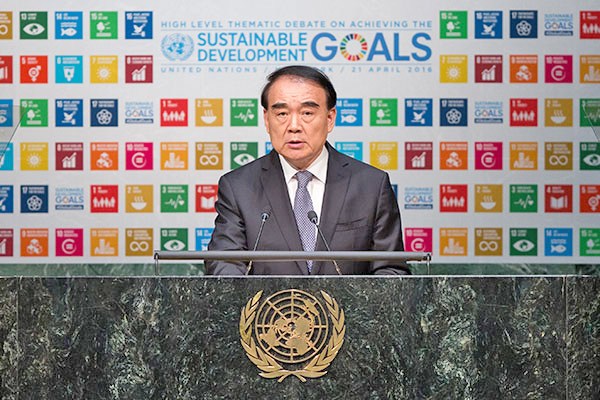G20 Hangzhou: Achieving UN 2030 goals hard but possible

China’s vice minister of Foreign Affairs and G20 Sherpa Li Baodong addresses the UN General Assembly High-Level Thematic Debate on Achieving the Sustainable Development Goals on April 21, 2016, urging all parties to start implementing the 2030 Agenda in a comprehensive manner.
China will build upon the UN 2030 Agenda during the country’s tenure as the rotating head of the G20, demonstrating the sense of responsibility and leadership that all great nations should have, said Amar Bhattacharya, a scholar from the US-based Brookings Institution.
Bhattacharya, a senior fellow at the institution’s Global Economy and Development Program, said China has shown the world it is possible for a developing country to be a leader in global development.
He added that China’s leadership in multinational institutions has increased the voice of developing countries on the world stage. The UN 2030 Agenda for Sustainable Development shares common aims with China’s plan for development, he said.
“The G20 is a bipolar organization, and needs to be healed from this condition. On the one side, it is focused on promoting worthy aims, including the Agenda 2030. On the other side, it works to stimulate a world economy that is unsustainable and destructive to the Earth’s ecosystem,” said Andreas Kraemer, a senior fellow from the Institute for Advanced Sustainability Studies in Germany.
The G20 should adopt a socio-ecological approach to reforming macroeconomic policies to overcome its internal contradictions, Kraemer suggested.
To better serve the Agenda 2030, the first step for the G20 is to delegate to the right institutions the responsibility for creating a fair and legitimate quality-control system, said Yves Tiberghien, the director of the Institute of Asian Research at the University of British Columbia in Canada.
Increased financing for infrastructure is the core component of the plan to implement the agenda, Yves said. The G20 must assign all multilateral development banks the task of coordinating among the effective sources of funding to develop a system that embeds the private sector into the framework of infrastructure financing.
Implementing the agenda requires the heads of all G20 member countries to provide the necessary leadership and to raise awareness among the citizens for the need for transition toward inclusive and sustainable growth in the global economy. This could be achieved individually within the borders of member countries and collectively through global forums, Yves said.
A report drafted by groups of senior government officials and prominent policy analysts from China and abroad, aiming to offer advice on how the G20 can play a proactive role in 2016, was released on July 21 after the International Summit on Global Governance’s New Frontiers in Zhejiang University.
The report suggests that leaders could bring domestic priorities in line with the long-term sustainability goals of Agenda 2030, which could be done by coordinating resources and efforts in order to chart new pathways to sustainability over the next 15 years.
The G20 should develop effective monitoring mechanisms on the implementation of the national goals, urging the release of an annual report by international organizations participating in the G20 on progress made toward achieving these commitments. It should identify the impact reforms have on progress toward the agreed-upon quantitative targets, the report suggests.
Zhao Yuan is a reporter at the Chinese Social Sciences Today.
